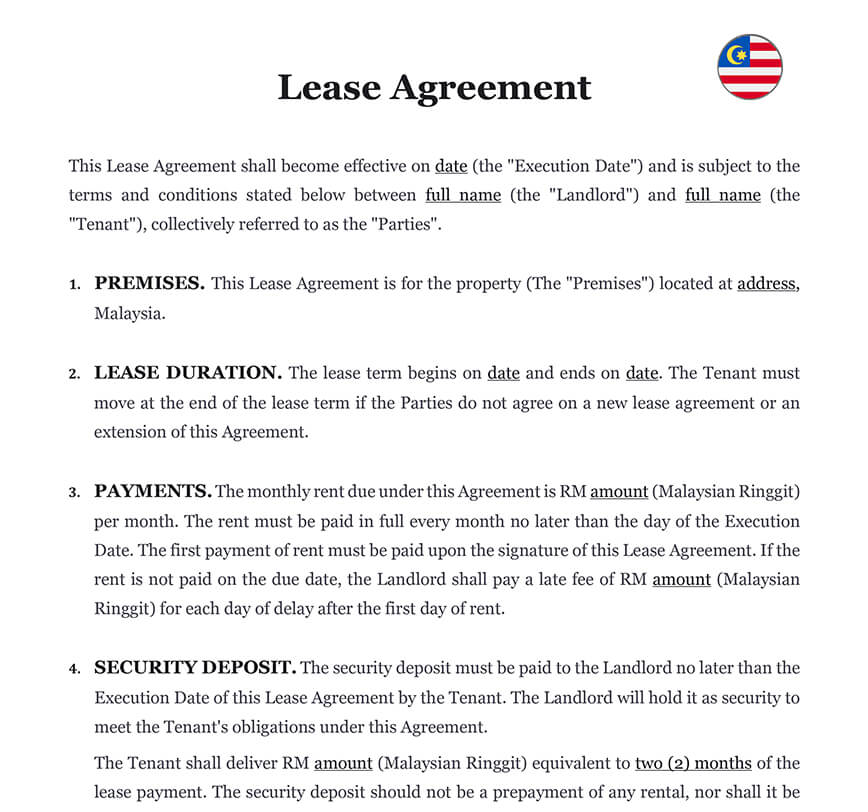Ready to use legal template
Drafted by experienced lawyers
Chinese-English translation
Ready to use legal template
Drafted by lawyers
Chinese-English translation
Home › Rent your property › Lease agreement
Learn more about Lease Agreement in China
A Lease Agreement is a legal contract between a landlord and tenant that outlines the terms for renting a property, including rent amount, payment dates, duration, and responsibilities of both parties. This document is crucial for protecting the interests of both the landlord and tenant, ensuring clear expectations and preventing future disputes. While local regulations may vary in different regions, our customizable Lease Agreement template is designed to be suitable for use anywhere in China. It’s easy to edit in Word format, complies with national laws, and includes certified English and Chinese translations for full understanding. Download it today to create a legally sound, locally applicable agreement tailored to your needs.
Table of contents
-
What is a Lease Agreement in China?
-
What is included in this Lease Agreement?
-
How do you make a Lease Agreement legally binding?
-
How do you terminate a Lease Agreement in China?
-
Can you modify a Lease Agreement after signing?
-
What are the Landlord’s rights in China?
-
What are the Tenant’s obligations in a Lease Agreement?
-
Do Lease Agreements vary by province in China?
What is a Lease Agreement in China?
A Lease Agreement in China is a legally binding contract between a landlord and a tenant that outlines the terms and conditions for renting a property. It serves as a critical document to clarify rights and responsibilities, avoiding disputes during the rental period. Governed by China’s Civil Code, this agreement ensures both parties understand their obligations, such as rent payment, property maintenance, and lease termination conditions.
Whether you are renting a house or an apartment, this contract is required to formalize the arrangement and provide legal remedies if disputes arise. For tenants, it offers protection against unfair eviction, while landlords can rely on it to enforce timely rent payments and preserve the property’s condition. If you are looking to rent out office space, a store, or a warehouse in China, you can refer to our Commercial Lease Agreement.
What is included in this Lease Agreement?
A well-drafted Lease Agreement in China covers all essential aspects to ensure compliance with local rental laws and smooth cooperation between landlords and tenants. Below are the key sections typically included in the document:
| ➤ Premises: The agreement defines the leased property’s location with precise details, including the address and property description. This ensures there is no ambiguity about the property in question. |
| ➤ Lease Duration: This section specifies the lease’s start and end dates, as well as conditions for renewal. Lease terms in China commonly range from six months to two years, depending on the type of property and local market practices. |
| ➤ Payments: Details of rent payments are clearly outlined, including the amount, due dates, and accepted methods. Payments are typically made in Chinese Yuan (CNY), with digital payment platforms such as WeChat Pay or Alipay often accepted for convenience. |
| ➤ Security Deposit: In line with Chinese law, a two-month security deposit is required. Conditions for its return are detailed, ensuring the tenant receives their deposit back if no damages or outstanding bills are reported at the end of the lease. |
| ➤ Property Rules: Specific rules for the use of the property are mentioned, such as no smoking, no pets, and maintaining noise levels. Adhering to these rules helps maintain a harmonious living or working environment. |
| ➤ Consent to Sublease: Tenants are prohibited from subleasing the property without the landlord’s written approval. This clause protects landlords from unauthorized use of their property. |
| ➤ Keys and Addenda: The agreement includes procedures for handing over and returning keys to prevent security issues. |
| ➤ Utilities and Services: Tenants are responsible for paying utilities, such as electricity, water, and internet, with no rent reductions allowed for service interruptions unless explicitly stated. |
| ➤ Maintenance and Repairs: Minor repairs fall under the tenant’s responsibilities, while the landlord handles major repairs. This division ensures that the property remains functional and livable. |
| ➤ Alterations: Tenants cannot make alterations to the property, such as painting walls or adding fixtures, without prior written consent from the landlord. |
| ➤ Termination: Conditions for lease termination are defined, covering issues like non-payment of rent, breach of rules, or illegal activities. |
| ➤ Governing Law and Jurisdiction: The agreement is governed by Chinese law, with any disputes handled by local courts where the property is located. |




